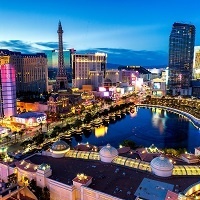The chief executive of MGM Resorts addressed skepticism over the future of Las Vegas tourism this week, pushing back against criticism and offering a more optimistic view of the city’s prospects. Their CEO, Bill Hornbuckle, spoke before Nevada gaming regulators as part of MGM’s licensing review, calling negative narratives about Las Vegas tourism “silly.” He argued that long-term trends point to steady gains, and that recent soft spots are part of a normal cycle.
According to Hornbuckle, Las Vegas gaming revenue has grown on average 4.5 to 5 percent per year over the past 30 years. He said that claims of a fundamental decline in demand for the city do not align with that historical record. While acknowledging that the pandemic years were extraordinary, he asserted that the underlying market still remains strong. One of his arguments cited a division in the market: the luxury segment is currently holding up better than lower-price or value offerings.
Hornbuckle also mentioned a recent promotional effort by the Las Vegas Convention and Visitors Authority that nearly doubled room reservations over five days, which he said illustrates the city’s continued allure for travelers. Despite forecasts suggesting a roughly 11 percent drop in visitor numbers in 2025 compared with the prior year, he struck an upbeat tone. He noted that strong events such as the Super Bowl and the Las Vegas Grand Prix helped drive 2024’s performance, and that future conventions are expected to support demand.
Hornbuckle also detailed MGM’s expansion strategy beyond Las Vegas as part of a broader effort to diversify. He referred to his company’s domestic growth plans in markets such as New York and Texas, and to large international projects including a planned $12.5 billion resort in Osaka, Japan, and a hotel development in Dubai with potential for gaming. He also pointed to growth in digital operations, particularly through MGM’s BetMGM joint venture and increasing activity in Brazil.
His comments offer a counterpoint to more pessimistic assessments of Las Vegas tourism, maintaining that cyclical ebbs are typical, but that the city’s core strengths — including luxury appeal, global reach, and digital integration — can sustain future growth despite short-term headwinds. And let’s also remember that MGM Resorts just extended their agreement with Formula 1 for the Las Vegas Grand Prix race.



